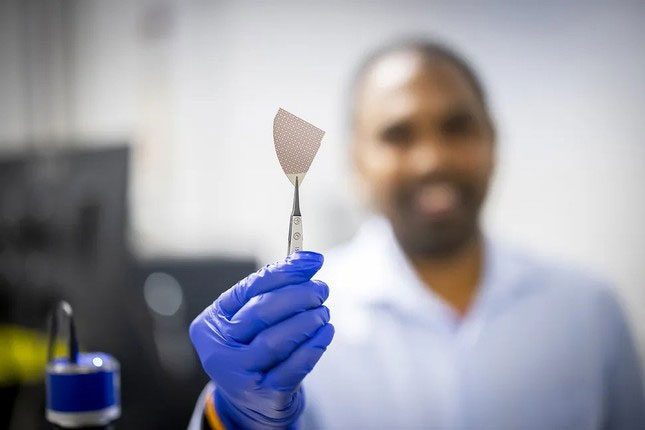A new ultra-high-temperature computer storage device can operate at temperatures akin to those found on Venus and could be utilized in extreme conditions such as nuclear power plants and even for future NASA missions.
The new computer storage device can function at temperatures hot enough to melt rock, paving the way for computers to operate in harsh environments on Venus.

The computer storage device is made from aluminum scandium nitride ferroelectric, capable of withstanding extreme temperatures. (Photo: University of Pennsylvania).
The most durable non-volatile memory (NVM) devices available today, such as solid-state drives (SSDs), can fail at temperatures reaching 300 degrees Celsius. However, scientists have developed and tested a new ferroelectric diode (a semiconductor switching device) that continues to operate for hours even when temperatures are raised to 600 degrees Celsius.
This means that sensors and computing devices using diodes can be placed in extreme environments—such as nuclear power plants, deep oil exploration operations, or the hottest planets in our solar system—where they could previously fail within seconds.
The NVM device is constructed using a material known as aluminum scandium nitride (AlScN). This material represents the cutting edge of materials science and has only emerged as a viable option for high-performance semiconductors in the past five years.
Here, the device is based on an AlScN diode that is 45 nanometers thick, which is less than 1,800 times the width of a human hair.

Scientists are using aluminum scandium nitride to develop computers that can function on extremely hot planets like Venus. (Photo: SCIEPRO).
Dhiren Pradhan, a postdoctoral researcher in systems engineering and electrical engineering at the University of Pennsylvania, USA, noted that one of the most remarkable findings of the team is that the devices can handle one million read cycles while maintaining a stable on-off ratio for more than six hours—an unprecedented result.
This work builds on existing research on semiconductors that can also operate at extreme temperatures. Scientists indicate that by adding this memory, you can have a computer that can function almost anywhere.
Deep Jariwala, an associate professor of electrical and systems engineering at the University of Pennsylvania, stated: “This is not just an improvement in devices but also a significant advancement in science and technology.”
Notably, scientists believe that a new era of non-silicon computing devices may emerge, integrating memory and processing closer together for data-intensive tasks such as artificial intelligence (AI).
The researchers believe that this new approach—combining heat-resistant memory and processors—could ultimately lead to AI processing in extreme conditions on other planets.


















































